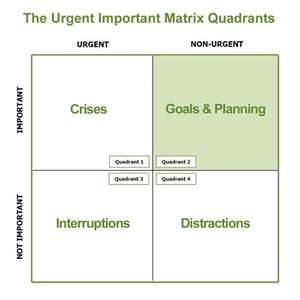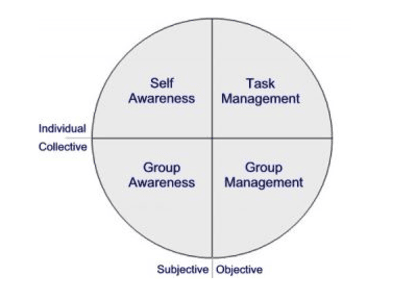Anyone who’s worked with me knows that I’m preoccupied with two things that often feel at odds: getting things done, and making sure we don’t lose our humanity in the process.
When I first entered the work force, I was mainly concerned with getting things done. Much of that pressure was self-imposed: in my early 20s, I wanted to establish myself. I read the productivity books and spent a lot of energy thinking about how I could squeeze more work out of each hour.
If I were to summarize those years (that decade, really) with a single image, it would be the Eisenhower matrix, which plots tasks according to their level of urgency and importance.

Credit: thecoachingtoolscompany.com
I loved that matrix. I still use it, at least in the abstract, to stay focused. But this matrix has its drawbacks. If you or your organization is under-resourced and overextended, you’re probably still spending a lot of time in that Urgent/Important (aka Crises) quadrant, without much bandwidth for Goals and Planning. (If this resonates with you, strategic planning can help.) More critically, the Eisenhower Matrix doesn’t offer much real estate to serendipitous personal connection. Is that spontaneous coffee with a colleague an interruption or a distraction? Does it matter if you spend your time brainstorming a project idea, venting about a new organizational policy, or catching up on your children?
Consider Culture
These days, I use a different matrix. As I described in a previous newsletter, the Integral Facilitation model restores the critical, human elements to the way we approach work. Task, process, self, and culture are all equally important: they require both attention and intention. (And even if you believe you don’t have time to “do culture,” you are actually doing it every day, whether you realize it or not.)

Credit: Living Giving Enterprises
Both matrices are useful heuristics, yet they tend to work best when you have time and mental space to plan.
And frankly, these don’t feel like normal times. Across all my work—whether with consulting clients, volunteer commitments, or community organizing—I keep encountering the same thing: people are tired and overwhelmed. If they’re fortunate enough to have a job, they may be losing friends and colleagues to layoffs, facing job insecurity due to looming federal cuts, and being asked to do more with less. Especially for those working in higher education and mission-driven organizations, they’re experiencing demoralizing attacks on their core values.
If you’re feeling drained, you’re not alone. And if you’re leading an organization, odds are that your team is feeling drained as well.
It’s a ready recipe for paralysis.
Add energy
How do you break out of it? Here’s my final image:

Photo by Cristian Escobar on Unsplash
The sparkler is a tribute to Karen Walrond’s superb The Lightmaker’s Manifesto: How to Work for Change without Losing your Joy. Her book is aimed at social activists, but her teachings should resonate with anyone trying to make a positive impact with diminishing resources (time, money, personnel, energy).
One key lesson: Figure out what contributions will give you joy and fill you with energy—not drain you.
I recently decided to apply this mindset to a couple of all-volunteer, mission-driven organizations I work with. I began with my usual description of ways to get involved. But then I continued:
There is much to do, and our needs are great. Here’s the good news: there is no need to do something that drains you. Take a moment to think about what you actually enjoy doing—what uses your skills and gives you energy. Every contribution matters. Odds are, we have just the right thing for you to take on.
Is it time consuming to tailor work to individual interests? Absolutely. But the payoff has been immense. If you give people work that they find energizing and satisfying, they’re more likely to follow through and even surpass your expectations.
Final thoughts
Of course, we don’t always have the luxury of being so selective. Sometimes the to-do list is full of decidedly less fun tasks. And if you’re in a workplace driven by performance metrics and billable hours, it can be tough to focus first on the things you love.
But if you are frozen by all that needs to happen, or if you’re leading a team on the verge of burnout, try starting with whatever energizes you and rebuilds your reserves to move forward.
Copyright 2023 Intellerate Consulting. All rights reserved.
